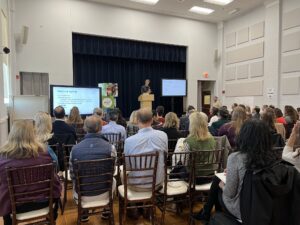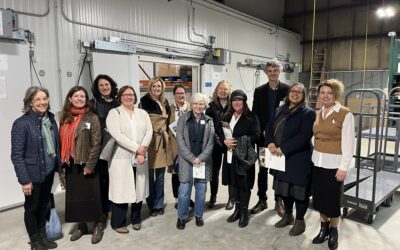 By Michelle Xiarhos Curran
By Michelle Xiarhos Curran
Bouncing forward, not back, was the mantra for the day, as Essex County Community Foundation (ECCF) gathered nearly 100 business, government, nonprofit and philanthropic leaders for a Think Lab that asked participants to envision a climate resilient Essex County for all.
The engaging, fast-paced brainstorming session, one of many that ECCF has convened since the start of the pandemic, was held at Essex North Shore Agricultural and Technical School in Danvers on November 16.
Two keynote speakers kicked off the Think Lab by providing context and data surrounding the concept of climate justice: a term and a movement that acknowledges that climate change can have differing social, economic, public health and other adverse impacts on underserved populations.
We saw this concept play out during COVID, when low-income communities and communities of color were disproportionately impacted by the virus.
“COVID taught us a lot about resilience,” said Penn Loh, lecturer in the Department of Urban and Environmental Policy and Planning at Tufts University. “It’s not about ‘bouncing back’ to normal, but ‘bouncing forward’ to transform the systems that produce vulnerability and injustice in the first place.”
It was grassroots organizations in the most highly impacted communities that were called upon to pivot and support those most in need. To equitably ‘bounce forward’ from climate and environmental challenges, it will now also require that same expertise and proximity.
Loh, a former executive director at ACE – a Roxbury-based environmental organization that aims to empower low-income communities and communities of color – discussed some startling examples of how different people are impacted in different ways by environmental challenges.
In Massachusetts, he said, communities of color average 23 times more hazardous waste sites per square mile than whiter communities. And 24 of the 30 most environmentally overburdened communities are communities of color.
To understand what’s happening in Essex County, ECCF partnered with Evan Horowitz, executive director of the Tufts University Center for State Policy Analysis, to map climate challenges in the region, using an environmental justice lens that paired data with conversations, identifies trouble spots, highlighted racial and ethnic and racial inequities and provides a countywide summary of needs, challenges and promising interventions.
The full study will be released in the winter, but Horowitz presented four concrete measures that show how climate risks vary across the county.
Not surprisingly, flood risks and heat islands – areas of excess heat – are more prevalent in Essex County’s cities, home to the majority of the region’s people of color. Tree cover and electric vehicle adoption show the opposite pattern, with the wealthiest and least diverse neighborhoods in Essex County with more than double the tree coverage of low-income areas, and residents in the wealthiest zip codes eight times as likely to have an electric vehicle.
The risks of climate change, Horowitz said, are more acute for low-income and diverse communities of colors while the tools of remediation are concentrated elsewhere.
“This creates an opportunity for philanthropy and community-centered action, which is why you all are here,” added Horowitz.
And with that, attendees broke off into small groups and were tasked with brainstorming big ideas and potential experiments to move the needle on climate challenges in Essex County.
“This is where the best ideas come from,” said Stratton Lloyd, ECCF’s executive vice president and COO. “We want to step into that space of possibility.”
And the nine separate groups delivered.
From creating a climate resiliency coalition and building a workforce for planting hundreds of thousands of trees across the region to constructing a large-scale indoor growing facility for fresh food and creating a “green” fund that would support projects like solar energy for nonprofits and tree planting – Essex County’s leaders in the sustainability space are already thinking big.
“The kind of conversations you are having here today are right up our alley,” said Jim Bauer, business development manager for Resonant Energy, a solar company that specializes in bringing solar to underserved communities in Massachusetts and beyond.
Other Think Lab participants expressed similar enthusiasm for the ECCF-led collaboration, the same type of collaboration that laid the foundation for ECCF’s work in digital equity, behavioral health and food insecurity.
“Who else would bring us together?” said Julia Frost, who works in community engagement at Arjuna Capital, an investment firm focused on economic vitality, environmental responsibility and social justice. “Seeing this catalyzed is really exciting for me.”
Watch for the full report on the Climate Resilience Think Lab, and data from the Tufts University Center for State Policy Analysis, coming in early winter.


